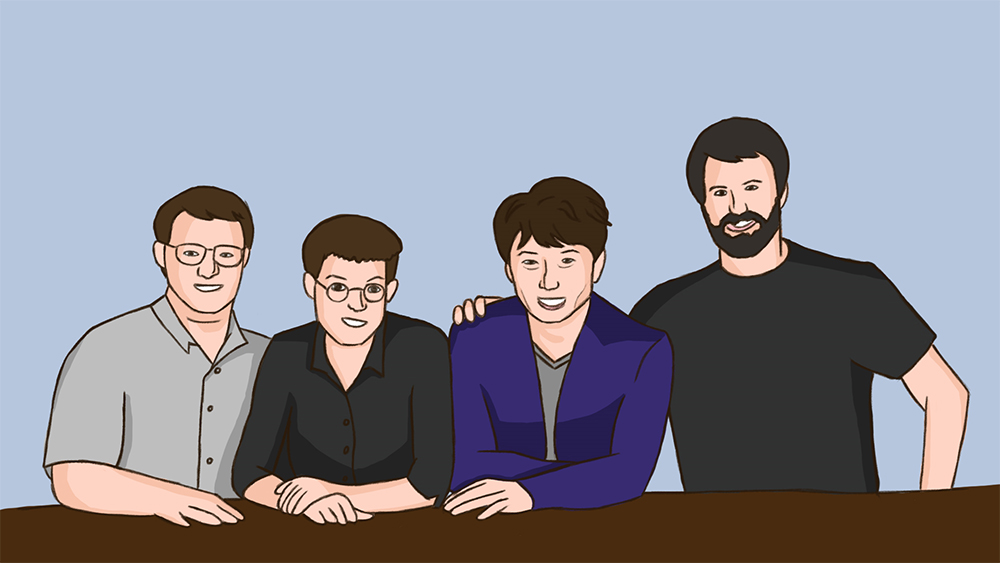Tech Trailblazers : Immunoscape
It is not easy being an entrepreneur, and few are willing to take that first step plunging into the uncertainties of starting their own company. For many scientists, nothing is more satisfying than seeing their research go from bench to bedside. In this series, we speak with various start-up founders and explore their entrepreneurial journey with A*STAR’s commercialisation arm, A*ccelerate, and discover how, with dedication and a little bit of luck, they are able to turn their innovations into exciting businesses that impact lives.

From left to right: Evan Newell, Co-Founder / Advisor ImmunoScape / currently PI Fred Hutch Cancer Research Center (previously PI SIgN); Alessandra Nardin, Co-Founder / COO ImmunoScape; NG Choon Peng Co-Founder / CEO ImmunoScape; Michael Fehlings, Co-Founder / Director Scientific Affairs ImmunoScape.
Immunoscape
Founded in 2016, Immunoscape is a spin-off from A*STAR. It is currently studying the immune response to COVID-19 to support the global search for a vaccine. The core immune profiling technology of Immunoscape – developed at A*STAR’s Singapore Immunology Network – is exclusively licensed from A*STAR. It speeds up drug development by identifying biomarkers, tracking the immune responses of clinical trial subjects, and discovering novel targets. The four co-founders – Dr Alessandra Nardin, Dr Michael Fehlings, Dr Evan Newell and Mr Ng Choon Peng – previously held various positions in A*STAR.
To support ImmunoScape’s lab-to-market journey, A*ccelerate pitched and matched the company to the right investors to raise funds. In just a year, the company raised US$11 million to build capabilities and scale their operations. A*ccelerate has also provided Immunoscape with mentorship and market research to chart its plans.
Ng Choon Peng, founder of Immunoscape, lets on why he decided to embark on his entrepreneurial journey.
What motivated you to start your company?
One in three people will have cancer in their lifetimes. In developed countries, this number has become one in two. There is a huge unmet need for cancer treatments, and it is no wonder that of all the clinical trials conducted across the world today, close to half of them are for cancer.
When the other co-founders of Immunoscape and I were in A*STAR, we were strongly encouraged to commercialise technology and take our research forward to bring a positive impact on patients. Immuno-oncology was also identified as a fast-growing sector with many unmet needs. As a result, we created Immunoscape to provide the immunological insights generated from the high dimensional immune profiling platform to speed up drug development and lower the chances of clinical trial failure rate.
To date, we have worked on projects with organisations including the National Cancer Centre Singapore, Genentech, and Gilead.
What were some of the biggest challenges you faced when setting up your company?
In our early years, we realised there was a lack of deep tech investors in our local ecosystem. It is heartening to see that 3 to 4 years down the road, the local ecosystem now has more venture capital companies with PhD talent who understand the science to conduct due diligence and make informed decisions.
How did A*STAR/ A*ccelerate helped you to navigate those challenges?
A*ccelerate played a big role in introducing Immunocape to our Series A lead investor, University of Tokyo Edge Capital. Subsequently, it was also through A*ccelerate that we met a US investor from Anzu Partners (San Diego), eventually leading to our Series B funding round that closed in Jan 2020.
Today, both American and Japanese venture capitalists are helping Immunoscape grow in the number one and number two immuno-oncology markets in the world. A*ccelerate’s help was critical.
A*STAR’s support for Immunoscape in terms of access to niche talent, advanced technology and equipment were also crucial for the company’s early years.
What’s next for your company?
We aim to grow our presence in the USA. We will deepen our science and bring our cutting-edge technology to collaborators – expanding into different data acquisition platforms to derive even more insights. We want to grow our relationships with partners and become their indispensable drug development buddies. The goal is to be a highly valued entity that constantly asks itself what more we can do to push the boundaries of immunotherapy – eradicating cancer would be one big, hairy, and audacious end goal.
What are some tips you would have given to your younger self?
I should have been a better biology student when I was younger. I am doing everything I can to help my 15-year-old daughter to further her interest in her favourite subject – biology.
I should have started my entrepreneurship journey when I was younger. It does take a toll on my aging body when I take night calls with my US team and early morning calls with my US business partners, on top of working with my energetic Singapore team in between.
A*STAR celebrates International Women's Day

From groundbreaking discoveries to cutting-edge research, our researchers are empowering the next generation of female science, technology, engineering and mathematics (STEM) leaders.
Get inspired by our #WomeninSTEM
